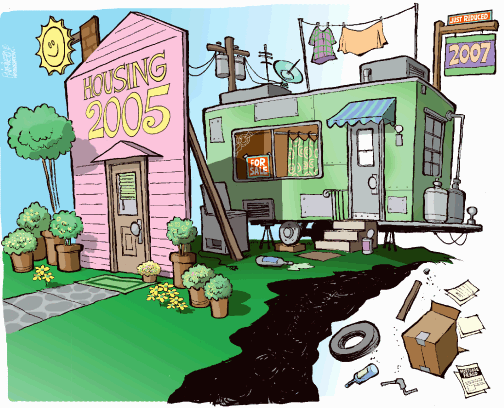 By Tom Purcell April 02, 2007
"For starters." "You're going to have to explain." "Well, it all dates back to 9/11. We'd already been in a recession when the terrorists attacked. To keep the economy from going into a free fall, then Federal Reserve Chairman Alan Greenspan lowered interest rates." "Yes, I remember." "People were suddenly able to afford houses they couldn't afford before. Home sales began to shoot up. As demand for housing rose, so did housing values." "Go on."  Artist Brian Fairrington, Cagle Cartoons Distributed to subscribers for publication by Cagle Cartoons, Inc.
"As housing values climbed, homeowners saw their equity climb. Others decided owning a home was the way to easy wealth, so they began to buy, too." "Which further drove up values?" "Exactly. Soon, frenzy was under way. Bidding wars were breaking out. It was common for sellers to receive multiple offers well beyond their asking price." "That was nuts." "That was human nature. When a big snowstorm is forecast, people rush to the store to hoard all the milk and toilet paper. The housing boom was like that." "It never crossed people's minds that they might be overpaying?" "Unfortunately not. It appeared to many people -- even rational, well-educated people -- that the rapid rise in values would never end. That caused speculators to jump into the market, which drove up values even more. It was about then that unqualified buyers jumped into the fray." "Unqualified buyers!" "Roughly 25 percent of Americans have a bad credit or unstable employment history. But this didn't stop loan originators from going after them, too. Mortgage brokers and banks get commissions and fees every time they originate a loan -- even risky loans." "Risky loans?" "Finance companies created special mortgages -- subprime loans -- for people who didn't qualify for the safer "prime" loans. Because these loans come with greater risks, higher interest rates are charged -- usually 2 or 3 percentage points higher. These loans are extremely profitable, as long as they are paid back." "I still don't see how it was possible." "The Washington Post's Steven Pearlstein explained how. Mortgage people created all kinds of nutty schemes. These included interest-only mortgages, no-money-down mortgages, adjustable- rate mortgages and so on. In some cases, loan applicants didn't even have to provide proof of income." "Didn't the mortgage people worry about defaults?" "Pearlstein explains that such loans are often sold to third parties. Thus, the loan originators didn't have to worry about the risk and they still got their commissions and fees." "So unqualified people were given giant loans to buy overvalued houses they couldn't afford? How did they keep up with the payments?" "As long as the buying frenzy continued, housing values kept getting pushed to even more insane heights. That allowed homeowners to either sell and cash out or borrow against their rapidly rising equity to get the money they needed to make their monthly payments." "They borrowed money to pay their mortgages!" "In some cases. It was a beautiful thing while it lasted. During the past four years, $9.5 trillion in new mortgage debt has been pumped into the housing industry. That money fueled one heck of a party." "But the party is over?" "I'm afraid so. According to Pearlstein, the subprime mortgage market is in a meltdown. He said that 1.5 million Americans may lose their homes to foreclosure. And hundreds of homes could be dumped onto a glutted market, further driving down values." "That's not good." "It gets worse. Consider all the jobs that depend on the housing market. Construction companies, cabinet manufacturers, furnishing companies ... an endless number of industries will be hurt as the correction ripples through the economy." "Correction?" "That's a term we like to use in the finance business. Translated it means: "Oops, we lost control of our senses yet again!" Tom Purcell's weekly political humor column runs in papers and Web sites across America. Tom Purcell is a humor columnist nationally syndicated exclusively by Cagle Cartoons. For comments to Tom, please email him at Purcell[at]caglecartoons.com Distributed to subscribers for publication by Cagle Cartoons, Inc. Publish A Letter on SitNews Read Letters/Opinions
|